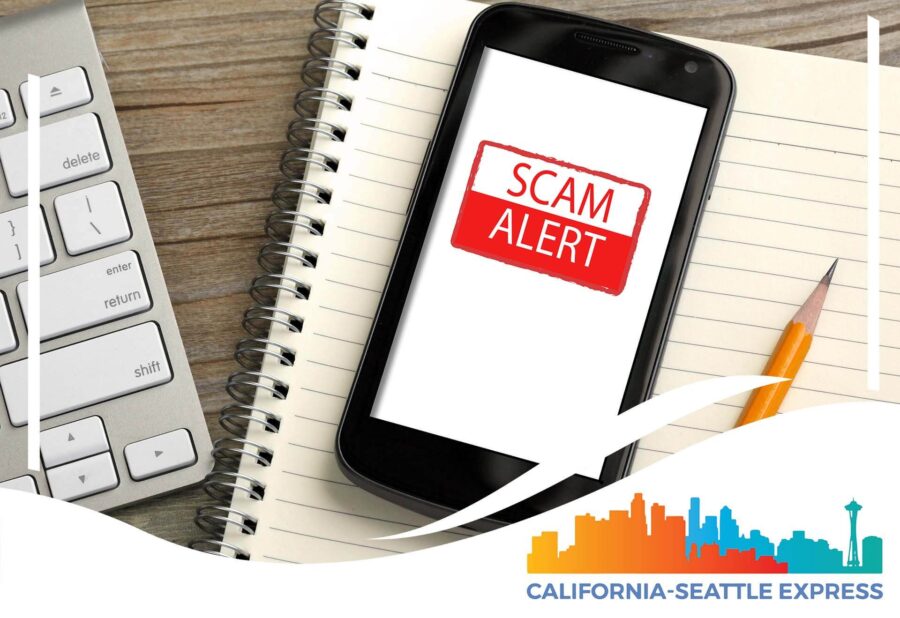If you’re in the process of relocating, you may be concerned about potential moving scams that could occur during the move. These frauds can result in anything from minor inconveniences to severe problems. Fortunately, there are steps you can take to protect yourself and ensure a smooth relocation without any worries. Read on to learn how to protect yourself from scammers.

#1 Unprofessional Way of Providing Estimate Is a Sign of a Moving Scam
When you are planning to move, one of the first things on your to-do list should be searching for reputable movers from Seattle to California or movers from California to Seattle and requesting estimates. This is a standard practice in the industry – it allows customers to compare different companies and prices. However, there are some unprofessional relocation teams that will try to give you an estimate over the phone without even seeing your belongings. This is a huge red flag, and it is a sign that the company is not reputable.
Not only this kind of quote won’t be correct, but these kinds of movers often raise the amount they had originally estimated. If a company is not willing to come to your home and give you an estimate or at least organize a video estimate, you should avoid doing business with them. Additionally, when choosing a team, request a written copy of the quote. By doing this, you can assure extra fees won’t be added to the total cost of your relocation.
Car Shipping Services
We can ship your vehicles using the best freight options available. Your car will be moved safely and securely and arrive as planned.
Packing Services
Our professional packers have methods and techniques to ensure all your items are intact during and after the move.
Storage Services
Looking for storage space while you get settled? California-Seattle Express provides 30 days free storage with your move.
Professional Long-Distance Movers Will Ask Questions About Your Home
A cursory walkthrough of your property by the company’s representative shouldn’t go without many questions on their side. The more they know about what you plan on keeping and what you want to get rid of when relocating, the more precise the estimate they will give. On the other hand, you should be alarmed if an estimator just walks through your residence disinterested.
Pick a Mover Whose Quotes Are Based on Weight Rather Than Cubic Feet
When getting organized to move, you should pay close attention to the company’s measuring system when they give you an estimate. Note that it’s one of the most important questions to ask moves. Reputable companies, especially cross-country ones, will bill you according to the weight of the objects they will move, not according to how much room they will occupy. Pricing of long-distance moving services based on cubic feet is a lot easier to manipulate than one based on weight.

#2 Asking for a Large Deposit Is a Red Flag When It Comes to Moving Scams
When choosing a relocation company, be careful of teams that demand huge amounts of cash upfront before any work is done. If you choose reputable movers, then they will likely not ask you to pay a deposit prior to your relocation, or the deposit amount won’t be significant.
Don’t make one of the most common relocation mistakes, and pay ahead of time. It will give the potential scammer total control of your relocation and the freedom to walk away with your money before they complete their part of the deal. Withholding payment or paying only a smart amount of money upfront will help ensure that your belongings are delivered in a safe and timely manner – just make sure to always use traceable payment methods.
The Surprisingly Low Quote Is Another Reason to Worry
People who do not have to worry about the cost of interstate relocation find it easier to move than those who are on a tight relocation budget. However, even if you want to find the cheapest way to move out of state, don’t go with the suspicious low quote. It’s yet another red flag and will probably end up with you paying additional fees you knew nothing about at the end of the move.
#3 Frequent Name Change Can Be an Indicator of Moving Fraud
Some businesses avoid Better Business Bureau (BBB) reviews and other fraud-busting organizations by rebranding themselves frequently. Scammers have found a way to get around complaints and bad reviews that their ex-customers write to warn other people. They set up new websites and make up a name shortly after they have scammed a couple of customers.
While a legitimate relocation team may have gone through a name change due to affiliation, it’s a red flag if they have done it many times in just a few years. That means they are distancing themselves from their past and hiding all the complaints and negative reviews. That’s why a thorough check is not only desirable but necessary as well.

#4 Fraudulent Cross Country Movers Avoid Providing Necessary Licenses
Every licensed relocation business is required by federal law to give their clients a brochure titled “Your Rights and Responsibilities When You Move,” which contains all the necessary information. It is 25 pages lengthy and provides input on ethical business conduct, professional standards and laws, and consumer rights.
Professionals must also provide you with their US DOT number. Federal Motor Carrier Safety Administration (FMCSA) requires that all interstate commercial truck and bus companies have a US DOT number. It serves as a unique identifier for commercial trucks and buses operating in interstate commerce. With this number, you can check the company’s status on license and insurance, but also check the company’s history of complaints on FMCSA’s website.

#5 Blank Contacts Are a Part of Moving Company Scams
It doesn’t matter how much you like doing business with certain movers; never sign an incomplete contract – make sure all you previously have agreed upon is there in writing. Your pick-up and delivery dates, household inventory list, estimate, price of packing service, as well as car shipping (if you plan on using them) – all should be listed in the contract.
In contrast to a blank contract, there is an agreement that loosely protects your assets and finances but covers this fact with difficult-to-understand legal jargon. Consult a lawyer and have them check the paperwork before you agree on anything if you have any doubts.
If you’re looking for a real-world example of how fraudsters operate, make sure you check the video below:
How to Avoid Becoming a Victim of a Relocation Scam?
It’s not an impossible goal to hire movers that will provide you with a completely stress-free move – you just need to learn how to avoid scammers by being aware of the typical frauds. Here are some recommendations for picking a mover that will provide you with the best relocation experience:
Demand video or in-sight estimates
When planning a move to another city, get at least three in-home or video estimates. These estimates should be free and based on the same information so you can compare them easily. If possible, have the estimator come to your home to do an in-person walkthrough so they can see exactly what needs to be moved. This way, you’ll get a more accurate estimate.
If an in-person estimate isn’t possible, ask the team to do a video walkthrough. This is where they send someone to your home to do a virtual walkthrough via Skype or another video chat service. Be careful of estimates that are too good to be true – they are usually red flags for scammers that will ask you for more money afterward.
Verify the business's address
When relocating to a new home, make sure the company you’re planning to hire is located where they say they are. The companies with a physical presence alongside the online one are more likely to be legitimate. This can be verified either through their website or by calling the business directly and asking for their address. Once you have their address, do a quick Google search to see if there are any red flags about the business.
If everything looks good so far, the next step is to give them a call. This is the best way to get a feel for what kind of company you’re dealing with. Make sure to ask them plenty of questions about their services, rates, policies, and the like.
Get as many reviews and recommendations as you can
One of the best methods to locate a reputable team is getting word-of-mouth and relocation tips from previous clients and real estate brokers. But don’t stop on that – look at reviews on the company’s website. However, note that con artists fabricate evaluations on their websites in order to lure a target into a trap. That is why it’s important to also look for previous experience on third-party websites, such as Yelp or BBB.
Avoid paying a sizable deposit and using cash
Moving companies typically require a deposit in order to secure your booking, and they may also request that you pay the full amount in cash. However, paying a large amount puts you at risk if the company turns out to be untrustworthy. If possible, try to find a mover that allows you to pay by credit card so you can dispute the charges if something goes wrong.
It’s also generally a bad idea to pay for your entire move in cash, as this leaves you with no recourse if the movers damage or lose your belongings. If you must pay in cash, be sure to get a receipt and keep it in a safe place.
Buy additional insurance
A reliable mover will provide you with additional options for protection in the event that your belongings are damaged during the relocation. Although it may not be your first choice when trying to save money on relocation costs, keep in mind that this additional protection is more than worth it. You won’t have to worry about any possible accident down the road because your belongings will be fully covered during the move to another state.
What to Do If You Become a Victim of a Fraud?
State and local governments regulate interstate relocation companies, but a small division under the Federal Motor Carrier Safety Administration is in charge of cross-country movers. Each year, they get roughly 3,000 complaints, of which 600 involve claims of hostage situations involving private property. If you become a victim of fraud, there are a few things you can do to try to get your money back.
First, contact the Federal Motor Carrier Safety Administration to file a complaint. You can also contact your state’s Attorney General’s office or the Better Business Bureau and do the same. Finally, you can contact a local law enforcement agency to see if they can help you get your money back.
If you have been scammed, it is important to act quickly and take all necessary steps to get your money back. However, the best way to avoid becoming the victim of a moving fraud is to prepare for a move thoroughly. Be selective about who you entrust with your possessions, and make sure to go through all of the aforementioned long-distance relocation tips about selecting the right team.

Find the Reputable Cross Country Moving Company and Protect Yourself From Scams
Can you trust movers? Absolutely – but you need to make sure you’re working with a reliable team with years of experience and plenty of satisfied customers. Selecting a relocation team is one of the most important parts of planning a cross-country move. With so many options available, it can be difficult to know which professionals to trust with your belongings.
Unfortunately, there are a number of scams out there, and if you’re not careful, you could end up losing your possessions or worse. On the other hand, if you choose a trustworthy long-distance moving company, not only will you avoid scams, but you will also be able to move safely and efficiently.



